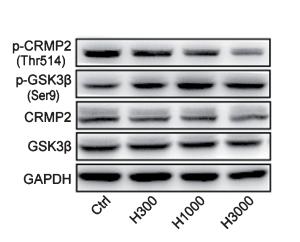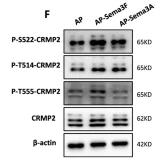Phospho-CRMP2 (Thr514) Antibody - #AF3459
| Product: | Phospho-CRMP2 (Thr514) Antibody |
| Catalog: | AF3459 |
| Description: | Rabbit polyclonal antibody to Phospho-CRMP2 (Thr514) |
| Application: | WB IHC IF/ICC |
| Cited expt.: | WB |
| Reactivity: | Human, Mouse, Rat |
| Prediction: | Pig, Bovine, Horse, Sheep, Rabbit, Dog, Chicken, Xenopus |
| Mol.Wt.: | 65/70kDa; 62kD(Calculated). |
| Uniprot: | Q16555 |
| RRID: | AB_2834897 |
Product Info
*The optimal dilutions should be determined by the end user. For optimal experimental results, antibody reuse is not recommended.
*Tips:
WB: For western blot detection of denatured protein samples. IHC: For immunohistochemical detection of paraffin sections (IHC-p) or frozen sections (IHC-f) of tissue samples. IF/ICC: For immunofluorescence detection of cell samples. ELISA(peptide): For ELISA detection of antigenic peptide.
Cite Format: Affinity Biosciences Cat# AF3459, RRID:AB_2834897.
Fold/Unfold
Collapsin response mediator protein 2; Collapsin response mediator protein; Collapsin response mediator protein hCRMP 2; CRAM; CRMP 2; CRMP-2; CRMP2; DHPRP 2; DHPRP2; Dihydropyrimidinase 2; Dihydropyrimidinase like 2; Dihydropyrimidinase like 2 long form; Dihydropyrimidinase related protein 2; Dihydropyrimidinase-related protein 2; DPYL 2; DPYL2; DPYL2_HUMAN; DPYSL 2; Dpysl2; DRP-2; DRP2; Musunc 33; Musunc33; N2A3; TOAD 64; TOAD64; ULIP 2 protein; ULIP-2; Ulip2; Unc-33-like phosphoprotein 2;
Immunogens
A synthesized peptide derived from human CRMP2 around the phosphorylation site of Thr514.
- Q16555 DPYL2_HUMAN:
- Protein BLAST With
- NCBI/
- ExPASy/
- Uniprot
MSYQGKKNIPRITSDRLLIKGGKIVNDDQSFYADIYMEDGLIKQIGENLIVPGGVKTIEAHSRMVIPGGIDVHTRFQMPDQGMTSADDFFQGTKAALAGGTTMIIDHVVPEPGTSLLAAFDQWREWADSKSCCDYSLHVDISEWHKGIQEEMEALVKDHGVNSFLVYMAFKDRFQLTDCQIYEVLSVIRDIGAIAQVHAENGDIIAEEQQRILDLGITGPEGHVLSRPEEVEAEAVNRAITIANQTNCPLYITKVMSKSSAEVIAQARKKGTVVYGEPITASLGTDGSHYWSKNWAKAAAFVTSPPLSPDPTTPDFLNSLLSCGDLQVTGSAHCTFNTAQKAVGKDNFTLIPEGTNGTEERMSVIWDKAVVTGKMDENQFVAVTSTNAAKVFNLYPRKGRIAVGSDADLVIWDPDSVKTISAKTHNSSLEYNIFEGMECRGSPLVVISQGKIVLEDGTLHVTEGSGRYIPRKPFPDFVYKRIKARSRLAELRGVPRGLYDGPVCEVSVTPKTVTPASSAKTSPAKQQAPPVRNLHQSGFSLSGAQIDDNIPRRTTQRIVAPPGGRANITSLG
Predictions
Score>80(red) has high confidence and is suggested to be used for WB detection. *The prediction model is mainly based on the alignment of immunogen sequences, the results are for reference only, not as the basis of quality assurance.
High(score>80) Medium(80>score>50) Low(score<50) No confidence
Research Backgrounds
Plays a role in neuronal development and polarity, as well as in axon growth and guidance, neuronal growth cone collapse and cell migration. Necessary for signaling by class 3 semaphorins and subsequent remodeling of the cytoskeleton. May play a role in endocytosis.
3F4, a monoclonal antibody which strongly stains neurofibrillary tangles in Alzheimer disease brains, specifically labels DPYSL2 when phosphorylated on Ser-518, Ser-522 and Thr-509.
Phosphorylation at Thr-514 by GSK3B abolishes tubulin-binding leading to destabilization of microtubule assembly in axons and neurodegeneration (By similarity). Phosphorylation by DYRK2 at Ser-522 is required for subsequent phosphorylation by GSK3B.
Cytoplasm>Cytosol. Cytoplasm>Cytoskeleton. Membrane.
Note: Tightly but non-covalently associated with membranes.
Ubiquitous.
Belongs to the metallo-dependent hydrolases superfamily. Hydantoinase/dihydropyrimidinase family.
Research Fields
· Organismal Systems > Development > Axon guidance. (View pathway)
References
Application: WB Species: Rat Sample: hippocampal
Application: WB Species: mouse Sample: N2a-APP cells
Restrictive clause
Affinity Biosciences tests all products strictly. Citations are provided as a resource for additional applications that have not been validated by Affinity Biosciences. Please choose the appropriate format for each application and consult Materials and Methods sections for additional details about the use of any product in these publications.
For Research Use Only.
Not for use in diagnostic or therapeutic procedures. Not for resale. Not for distribution without written consent. Affinity Biosciences will not be held responsible for patent infringement or other violations that may occur with the use of our products. Affinity Biosciences, Affinity Biosciences Logo and all other trademarks are the property of Affinity Biosciences LTD.




